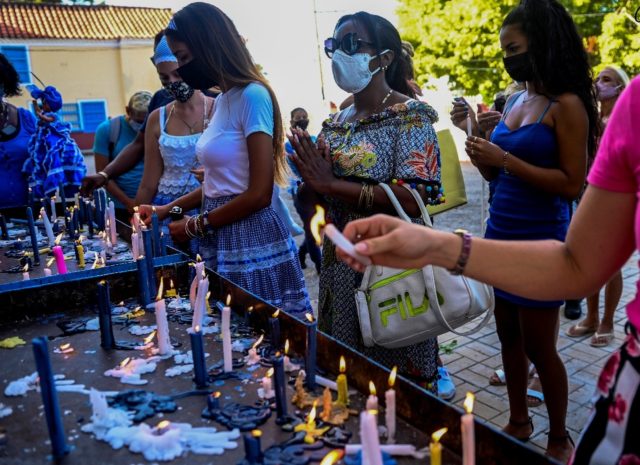For two months, Yunior Consuegra, 24, has been locked up along with hundreds of others arrested at historic anti-government protests in Cuba on July 11. His mother has seen him only once, and is beside herself with worry.
When she did manage to see him six days after his arrest, Mayda Yudith Sotolongo told AFP, her son had been “beaten” and had “bruises on his arms and back.”
The young man, a car mechanic, was born deaf in one hear and has a brain tumor. He told his mother by telephone that he had contracted the coronavirus in prison.
Consuegra is accused of public disorder, but has not yet been brought before a judge.
Her son, insisted Sotolongo, had gone out on the street that day “out of curiosity”, and observing riot police clamping down on protesters, tried to make his way back home safely, but failed.
She herself spent four days in jail for insisting to see her son, telling police that if, to have information about him she had to go to prison herself, they should arrest her.
They did, but this brought Sotolongo no closer to her son.
From her humble home on the outskirts of Havana, the 50-year-old nurse has little option left but to pray for an end to her “worst nightmare”.
Consuegra’s story is far from unique.
‘Freedom!’
Cuban forces arrested 949 people, according to the Cubalex rights group, in a massive clampdown on the biggest protests to hit the communist island since the revolution that brought Fidel Castro to power in 1959.
In a spontaneous outburst of anti-government sentiment, thousands took to the streets on July 11 in some 50 cities and towns, chanting “Freedom!” “Down with the dictatorship!” and “We are hungry!”
Cubalex says 437 remain behind bars.
Charges include contempt, public disorder, vandalism and propagation of the coronavirus epidemic for allegedly marching without face masks.
The government has not provided detention numbers, but says 62 people had been tried by August 5. Sixty-one were found guilty and given sentences ranging from eight months to a year.
Forty-five have lodged appeals.
In the city of Santa Clara in central Cuba, the family of Randy Arteaga, 32, fret about his fate. He is accused of the crime of resistance.
“We are worried. He has been in prison for almost two months, without a trial date,” his niece Misaday Arteaga, 21, told AFP.
“He has a six-year-old daughter.”
There are scores of similar testimonies, but several families contacted by AFP did not wish to speak for fear of reprisals.
‘Little hope’
Havana claims the protests form part of regime change efforts backed by Washington.
But the actions of the one-party state has drawn severe international criticism, most recently from the US Department of State’s Bureau of Western Hemisphere Affairs, which in a tweet on Tuesday accused Havana of reacting with “violence, internet shutdowns, and widespread arrests” to the protests.
“8 weeks later, hundreds are still under confinement with little hope for a fair trial,” said the tweet, urging people to join the #JailedForWhat? online campaign in support of “these political prisoners.”
The same day, President Joe Biden signed a one-year extension of a provision of the “Trading with the Enemy Act” under which the United States has maintained sanctions against the island nation since 1962.
Since the July protests, the government of President Miguel Diaz-Canel — also leader of the Communist Party of Cuba — has been rounding up dissidents and passed a cybersecurity law critics say aims to limit political and civic freedoms.
There has been a “strengthening of the repression policy of @DiazCanel to regain control and restore the culture of fear,” tweeted Amnesty International (AI) Americas director Erika Guevara-Rosas.
According to AI, Havana is holding six Cuban prisoners of conscience, including opposition leader Jose Daniel Ferrer and artist Luis Manuel Otero Alcantara, since July 11.
Government opponent Manuel Cuesta Morua said the government was seeking “to sow panic as a prophylaxis against future demonstrations.”
On Wednesday, authorities made their latest arrest: taking human rights activist Guillermo Farinas, 59, into custody outside his home in Santa Clara, according to his mother Alicia Hernandez.
The political upheaval comes as the country endures its worst economic crisis in 30 years, with chronic shortages of electricity, food and medicine and an uptick in coronavirus cases.

COMMENTS
Please let us know if you're having issues with commenting.